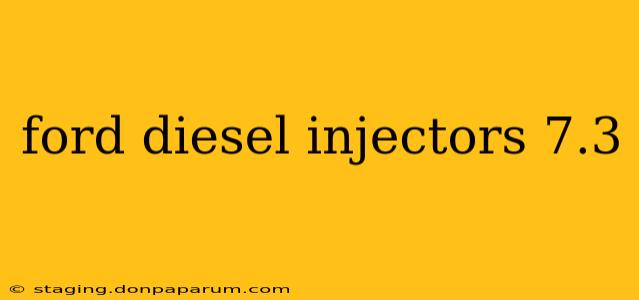The Ford 7.3L Power Stroke diesel engine, a powerhouse known for its durability and torque, relies heavily on its injectors for optimal performance. Understanding these crucial components is key to maintaining your truck's power and longevity. This guide delves into the intricacies of 7.3L Power Stroke diesel injectors, covering their function, common problems, and maintenance strategies.
Understanding the Role of Diesel Injectors
Diesel injectors are precision-engineered components responsible for delivering fuel into the combustion chamber under incredibly high pressure. Unlike gasoline engines, diesel engines don't use spark plugs for ignition. Instead, the fuel is injected at such a high pressure that it spontaneously combusts upon contact with the hot air in the cylinder. The 7.3L Power Stroke injectors are particularly vital because of the engine's design and its demands for robust power delivery.
Key Functions of 7.3L Power Stroke Injectors:
- Precise Fuel Delivery: The injectors precisely control the amount and timing of fuel injected into each cylinder, influencing power output, fuel economy, and emissions. Any deviation from this precision can significantly impact engine performance.
- High-Pressure Injection: These injectors operate at extremely high pressures, typically in the range of 20,000 PSI or more. This high pressure is essential for proper atomization of the fuel, leading to efficient combustion.
- Atomization: The injectors atomize the fuel, breaking it into a fine mist for optimal mixing with air. This fine mist ensures complete combustion, maximizing power and minimizing emissions.
Common Problems with 7.3L Power Stroke Diesel Injectors
While known for their durability, 7.3L Power Stroke diesel injectors aren't immune to problems. Over time, wear and tear, along with the demanding conditions of diesel operation, can lead to several issues:
Frequent Issues and Their Symptoms:
- Sticking Injectors: Injectors can become stuck open or closed, leading to rough running, loss of power, excessive smoke, and potentially catastrophic engine damage. Symptoms may include a sputtering engine, rough idle, or noticeable hesitation during acceleration.
- Leaking Injectors: Leaks can cause loss of fuel pressure, leading to reduced power, poor fuel economy, and potentially a build-up of unburnt fuel in the crankcase. This often manifests as a noticeable smell of diesel fuel.
- Clogged Injectors: Contaminants in the fuel can clog the injector nozzles, restricting fuel flow and impacting performance. Symptoms are often similar to sticking injectors, including rough running and a lack of power.
- Worn Injector Nozzles: Over time, the injector nozzles can wear down, leading to less precise fuel delivery and increased emissions. This often leads to a noticeable increase in black smoke from the exhaust.
Maintaining Your 7.3L Power Stroke Injectors
Proper maintenance is key to extending the lifespan of your 7.3L Power Stroke injectors and preventing costly repairs.
Essential Maintenance Practices:
- Use High-Quality Fuel: Employing premium diesel fuel with appropriate additives helps prevent fuel system contamination and prolongs injector life.
- Regular Fuel Filter Changes: Regular replacement of the fuel filter is critical to removing contaminants that can damage injectors. Follow the recommended maintenance schedule in your owner's manual.
- Monitor Fuel Pressure: Keep an eye on fuel pressure levels. Consistent low fuel pressure can indicate injector problems or other fuel system issues.
- Professional Inspection: Regular professional inspections can detect early signs of injector problems, allowing for preventative maintenance.
Conclusion
The 7.3L Power Stroke diesel injectors are essential components responsible for the engine's performance and reliability. Understanding their function, common problems, and maintenance strategies is crucial for ensuring the longevity and smooth operation of your Ford truck. By following these guidelines and seeking professional advice when needed, you can keep your 7.3L Power Stroke running strong for years to come.

